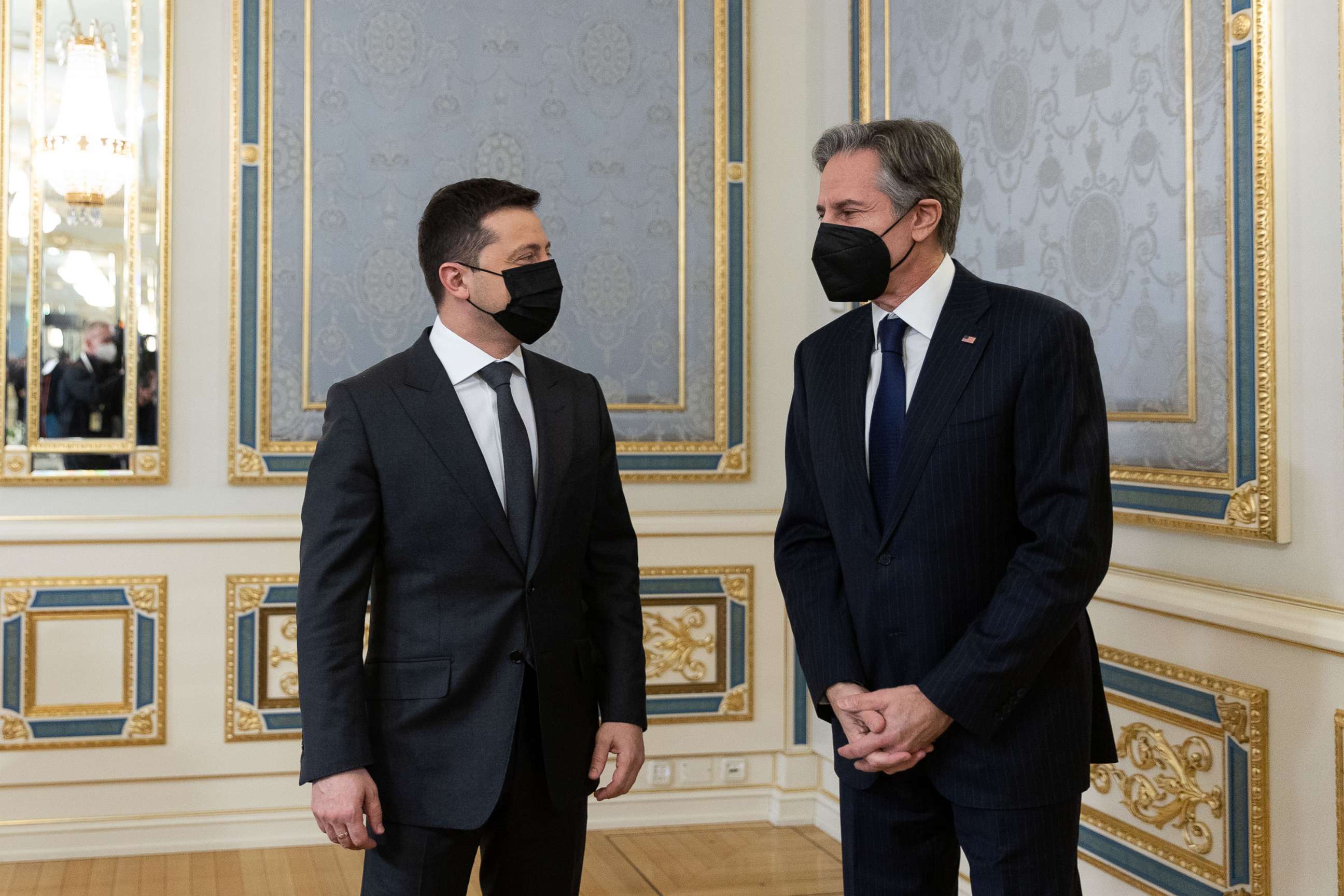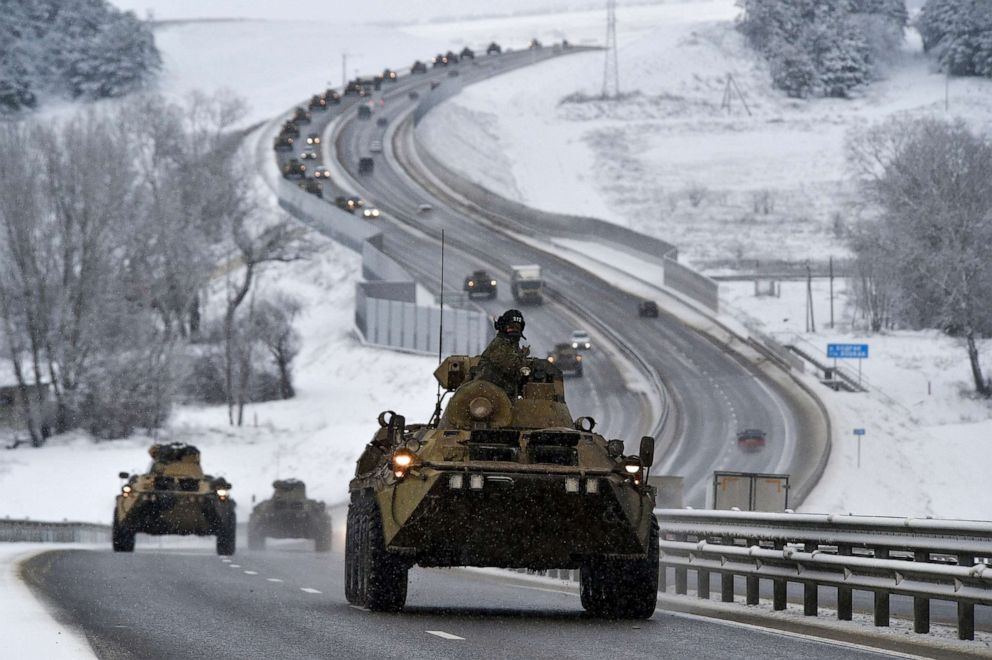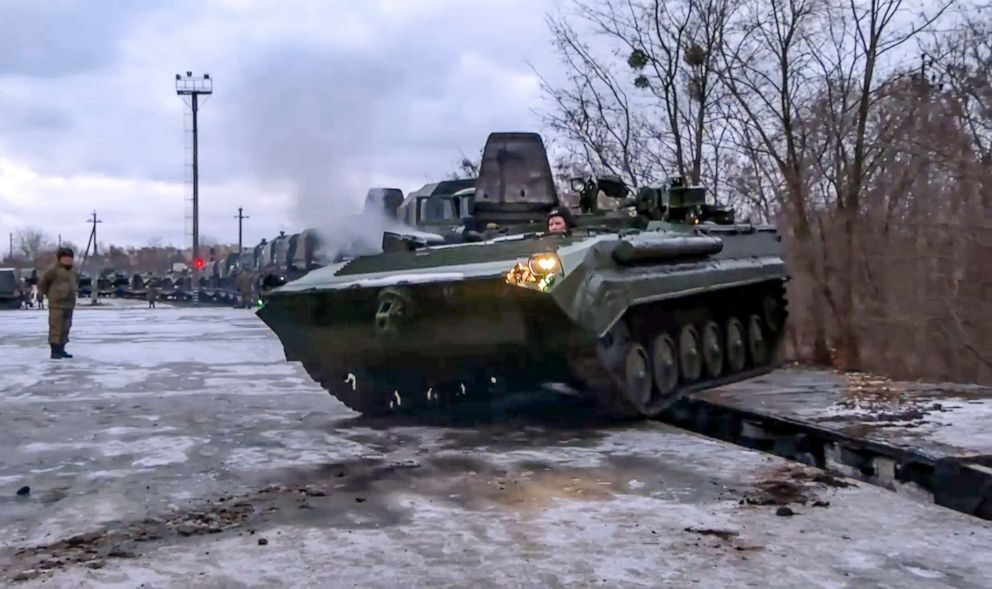Inside the diplomatic dash to stop a Russian attack on Ukraine
Secretary of State Blinken made a key visit to Kyiv, vowing continued support.
The U.S. will keep pursuing diplomacy to prevent a Russian attack on Ukraine, Secretary of State Antony Blinken told Ukrainian leaders in a last-minute visit to the capital, Kyiv, on Wednesday.
The visit, which included President Volodymyr Zelenskyy, was meant to send a strong signal to Russia ahead of Blinken's meeting with Russian Foreign Minister Sergei Lavrov on Friday -- a critical sit-down after the White House warned Russia could attack "at any point" now.
With approximately 100,000 troops massed near Ukraine's borders, including now in neighboring Belarus, Russia has demanded the U.S. and NATO bar Ukraine from joining the military alliance and pull back troops from Eastern European member states. If not, Russian leader Vladimir Putin has threatened "military technical" consequences, even as his government denies it is planning to invade.
Eight years after Russia's annexation of Ukraine's Crimean Peninsula and amid its slow-motion annexation of eastern provinces known as the Donbas, Blinken urged Ukrainians to unify and promised continued U.S. support.
"Don't let Moscow divide you," Blinken said during a press conference with Foreign Minister Dmytro Kuleba, adding, "As you stand up to efforts to divide, to intimidate, to threaten, the United States stands with you resolutely in your right to make decisions for your own future, to shape that future as Ukrainians for Ukraine."
As a critical part of that effort, President Joe Biden approved $200 million of military aid to Ukraine, a senior State Department official confirmed Wednesday. That brings total U.S. military assistance in the last year to over half a billion dollars -- $650 million in total, including Javelin anti-tank missiles, patrol boats, ammunition, medical equipment and more.

Biden approved the package late last month and used an authority to bypass arms control regulations to swiftly provide aid in an emergency, according to congressional sources briefed on the aid.
But the State Department had not confirmed the tranche was approved, even after it was reported in the media last week. There were fears that it would anger the Russians during three rounds of high-stakes talks -- between the U.S. and Russia, NATO and Russia, and at the Organization for Security and Cooperation in Europe.
Russian Deputy Foreign Minister Sergey Ryabkov, one of Russia's top negotiators during those talks, criticized giving U.S. arms to Ukraine again on Wednesday -- something Moscow has complained about as it casts its much smaller neighbor as a threat.
"We underline the necessity of ceasing boosting the war-like Ukrainian regime with arms deliveries, training assistance, the development of plans and their implementation in erecting military bases, conducting training events and a lot else that represents a direct threat for us," Ryabkov said, according to Russian news agencies.
The defensive weapons the U.S. has provided would do little to push back against Russia's overwhelming military power. Some analysts have suggested Russia may be considering an attack on Ukraine now before the former Soviet state's military grows stronger, its democracy and economy become more stable, and its relations fall into greater alignment with Western Europe and the U.S.
"We have been providing defensive assistance to Ukraine consistently, including deliveries that are taking place in just the last few weeks alone," Blinken told reporters, declining to provide details or even mention the $200 million.
Kuleba added that Ukraine is "very strong" now and praised the Biden administration for its "very good cooperation... in the area of military assistance."
"We know that the United States stands with us not only in the area of security but also in supporting our internal strength," he added.
But Republican lawmakers in Washington urged Biden to do more, including sanctioning Russian officials and providing more lethal arms to Ukraine before a potential Russian attack, not after one. Sen. Jim Inhofe, R-Okla., the top Republican on the Senate Armed Services Committee, said Biden's administration "is about three months behind where they should be at this time" and too focused "on what the U.S. would do after Russia invades, not what are they going to do to stop Russia from invading."
A bipartisan group of lawmakers met with Biden Wednesday morning, including senators who just returned from a congressional delegation to Kyiv. Both the White House and Republican senators described it as constructive and informative, with Sen. Kevin Cramer, R-S.D., saying Biden "listened attentively. He shared a lot as well."
Fighting in the Donbas has killed some 14,000 people and counting, with tensions periodically flaring as Russian forces or the local separatists they lead exchange artillery or sniper fire with Ukrainian troops. The gray-zone conflict has kept Ukraine on a war footing with fears that Russia could eventually annex the region, where it has given out Russian citizenship to residents. A bill urging Putin to recognize the Russian-controlled regions as independent was proposed in the Russian parliament Wednesday.
The U.S. also said it has intelligence that Russia has positioned operatives trained in urban warfare and explosives in Ukraine for potential "false-flag" operations that would give it pretext to attack. The Kremlin denied that was true, calling it "complete disinformation," but NATO Secretary General Jens Stoltenberg said Wednesday there is "a significant Russian presence of intelligence officers or operatives inside Ukraine" who are "trying to undermine the government, the authorities and also absolutely possible that they are also planning for different incidents, accidents, false flag operations."

A cyberattack on Ukrainian government websites Friday may have been part of that strategy as well, according to Ukrainian officials. Andriy Kuzmich, a senior Ukrainian government cyber official, called it "the largest cyberattack on Ukraine in the last four years, at least in scale," although it's unclear if Russian government or non-state actors were responsible. The U.S. has not made any attribution yet.
Amid all the threats and warnings, both sides seem to believe the door is still open to diplomacy with Blinken and Lavrov's Friday meeting. The Kremlin said the U.S. proposed the sit down.
Russian officials have said they are growing impatient with the series of meetings, with Ryabkov saying Wednesday they will not "wait endlessly."
"We are not prepared to get bogged down in the usual diplomatic, bureaucratic hoopla... We need a clear and direct answer, moreover in written form," they said.
On that last request, the U.S. and Russia are also at odds. The Russian Foreign Ministry published two draft treaties in December, laying out its demands about NATO, Ukraine and more -- many of which U.S. officials said were "nonstarters." But their demands to receive a response in writing are also for now being rejected.
"I won't be presenting a paper at that time to Foreign Minister Lavrov. We need to see where we are and see if there remain opportunities to pursue the diplomacy and pursue the dialogue," Blinken said in Kyiv. "We're taking stock of the conversations [last week] and will pursue this on Friday in Geneva, and I suspect I'll have more to say then."
Before traveling to Geneva, Blinken will stop in Berlin on Thursday to meet Germany's new chancellor Olaf Scholz and foreign minister, Annalena Baerbock, and hold a joint meeting with her and their British and French counterparts -- again projecting unity against Moscow.

Russia has been using its own alliances to strengthen its hand, speculating that it may position troops near the U.S. in two key Latin American ally countries, Venezuela and Cuba, and move forces into Belarus for joint military exercises.
Those troops, which first began arriving over the weekend, have alarmed U.S. officials, who have said it gives Russia another launchpad to attack Ukraine -- and one that's hundreds of miles closer to Kyiv. A senior State Department official warned Tuesday that Russia is seizing power in Belarus and questioned how involved strongman Alexander Lukashenko was in the decision to bring in Russian troops.
But some argue that all of these escalations -- Russian troop movements, bellicose rhetoric, draft treaties -- are about Putin creating leverage from a weak hand to project strength and protect himself.
"It just takes my breath away to watch how Putin pulls this on the American establishment again and again: threaten to escalate - negotiate - pull back; threaten to escalate - negotiate - pull back," Russian opposition leader Alexey Navalny told TIME from prison, the magazine reported Wednesday.
"Instead of ignoring this nonsense, the U.S. accepts Putin's agenda and runs to organize some meetings. Just like a frightened schoolboy who's been bullied by an upperclassman," added Navalny, who was poisoned by Russian agents and imprisoned upon his return to the country.
ABC News's Patrick Reevell contributed to this report from Kyiv, Ukraine, and Cindy Smith and Shannon Crawford from Washington.




